Get the best ideas for MyPlate meals! Learn my formula to make a healthy eating meal plate based on the MyPlate food guide. You’ll love how easy MyPlate meal planning is, allowing you to make a healthy breakfast, lunch, or dinner fast. Choose MyPlate meals when you want a balanced dish packed with the nutrition your body needs to be its best.
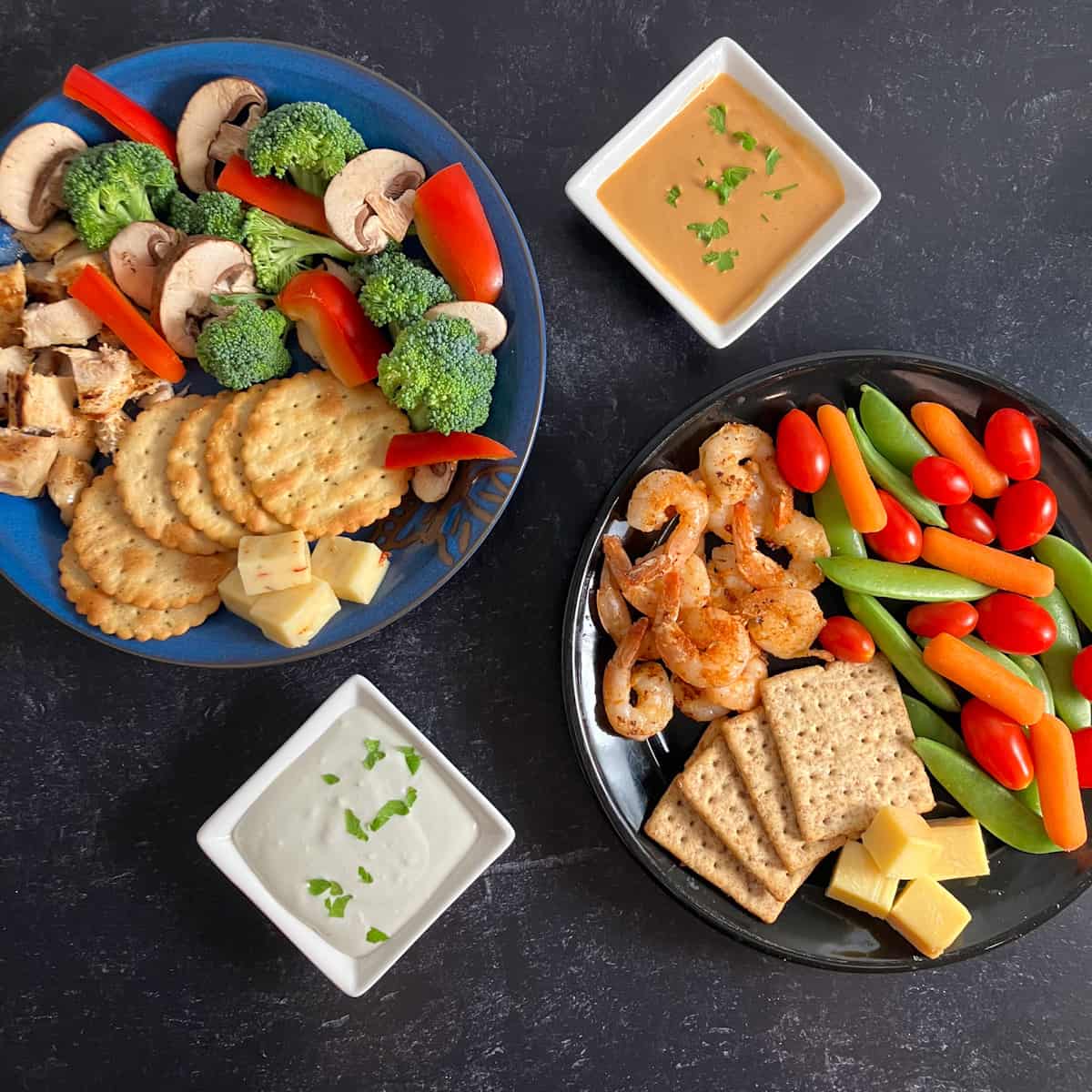
Want to save this post?
Enter your email below and we'll send it straight to your inbox. Plus you'll get great new recipes from us every week!
Table of Contents
🍽️ What is the MyPlate food plan?
The MyPlate meal plan is a visual plan for healthy eating based on the United States Department of Agriculture (USDA) Dietary Guidelines for Americans. Eating a healthy diet provides the essential nutrients you need, while lowering your risk for nutrition-related diseases such as heart disease and diabetes.
Here are the main recommendations for creating a balanced food groups plate (source):
- Make half your plate fruits and vegetables: focus on whole fruits and vary your veggies. (Fruit juice should be limited.)
- Make half your grains whole grains
- Vary your protein routine
- Move to low-fat or fat-free dairy milk or yogurt: calcium-fortified soy milk and lactose free dairy may also be used.
- Limit added sugars, saturated fat, and sodium
MyPlate meal plan ideas encourage the consumption of fiber-rich fruits and veggies, as well as filling lean protein. The MyPlate meal planner can accommodate vegan, vegetarian, and gluten-free diets.
In short, the healthy food on my plate doesn’t have to be the same as the healthy food on your plate. MyPlate is not your plate. It’s individualized nutrition, you dig?
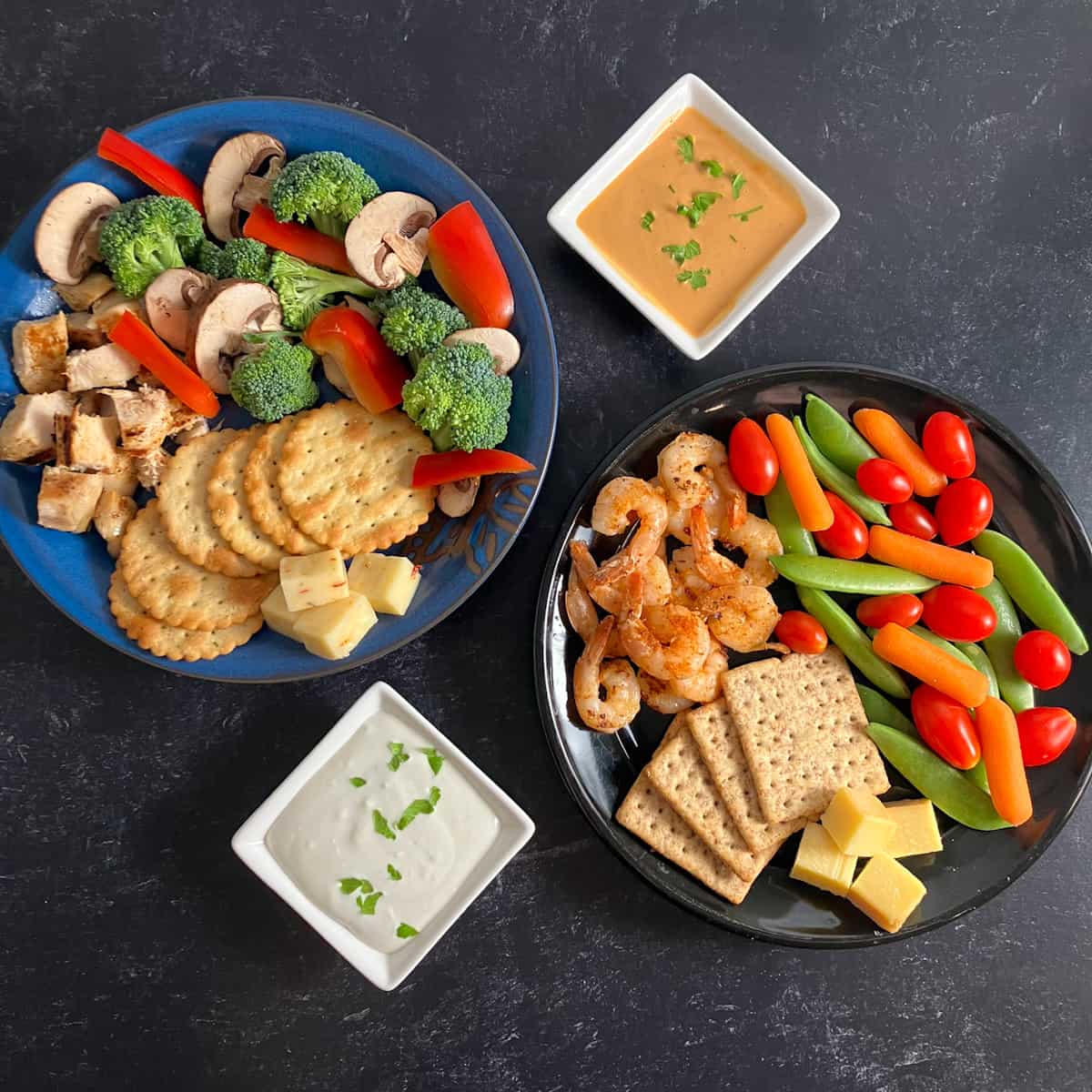
Many countries have their own visual representations of what a healthy diet looks like. For example, “My Plate UK” is called the Eatwell Guide. You can find a picture of the Eatwell plate on the British Heart Foundation site here.
🍲 How do you make a MyPlate meal?
MyPlate meals are simply healthy meals with all the food groups. The amount of food on your balanced dinner plate will vary based on certain factors (source):
- Age
- Sex
- Height and weight
- Physical activity level
MyPlate Food Groups
There are five food groups on the MyPlate. They are:
- Fruits
- Vegetables
- Grains
- Protein
- Dairy (and calcium-fortified soy)
You can find daily targets for these food groups based on the number of calories you eat in a day. For instance, here is the MyPlate daily plan for a 2000 calorie diet (source):
- 2 cups fruit
- 2½ cups vegetables
- 6 ounces grains (1 slice of bread, 1 tortilla, or ½ cup cooked grains such as barley counts as 1 ounce)
- 5½ ounces protein (1-ounce cooked meat, poultry, or seafood; ¼ cup cooked beans; 1 egg; or 1 tablespoon peanut butter counts as 1 ounce)
- 3 cups dairy (1½ ounces hard cheese counts as “1 cup” here- 3 cups of cheese would be quite a lot!)
I’ve developed a recipe (formula?) over the years to construct healthy MyPlate dinners and lunches. Here are the components I include in each meal, and I’ll cover each in more detail below:
- 4-6 ounces of protein (cut bite-sized)
- Three different non-starchy veggies (as much as you want; remember some vegetables are technically botanical fruits)
- One ounce of cheese (or another source of calcium)
- One serving of crackers (whole grain or another type)
- 2-4 tablespoons of dip (perhaps a source of healthy fat)
🍎 MyPlate Meal Examples
Here is one MyPlate meal plan example:
- 4 ounces seasoned shrimp
- Snap peas, grape tomatoes, and baby carrots (fill half the plate)
- 1-2 ounces whole grain crackers
- 1 ounce cheddar cheese
- 2-4 tablespoons yogurt-based dip with blue cheese
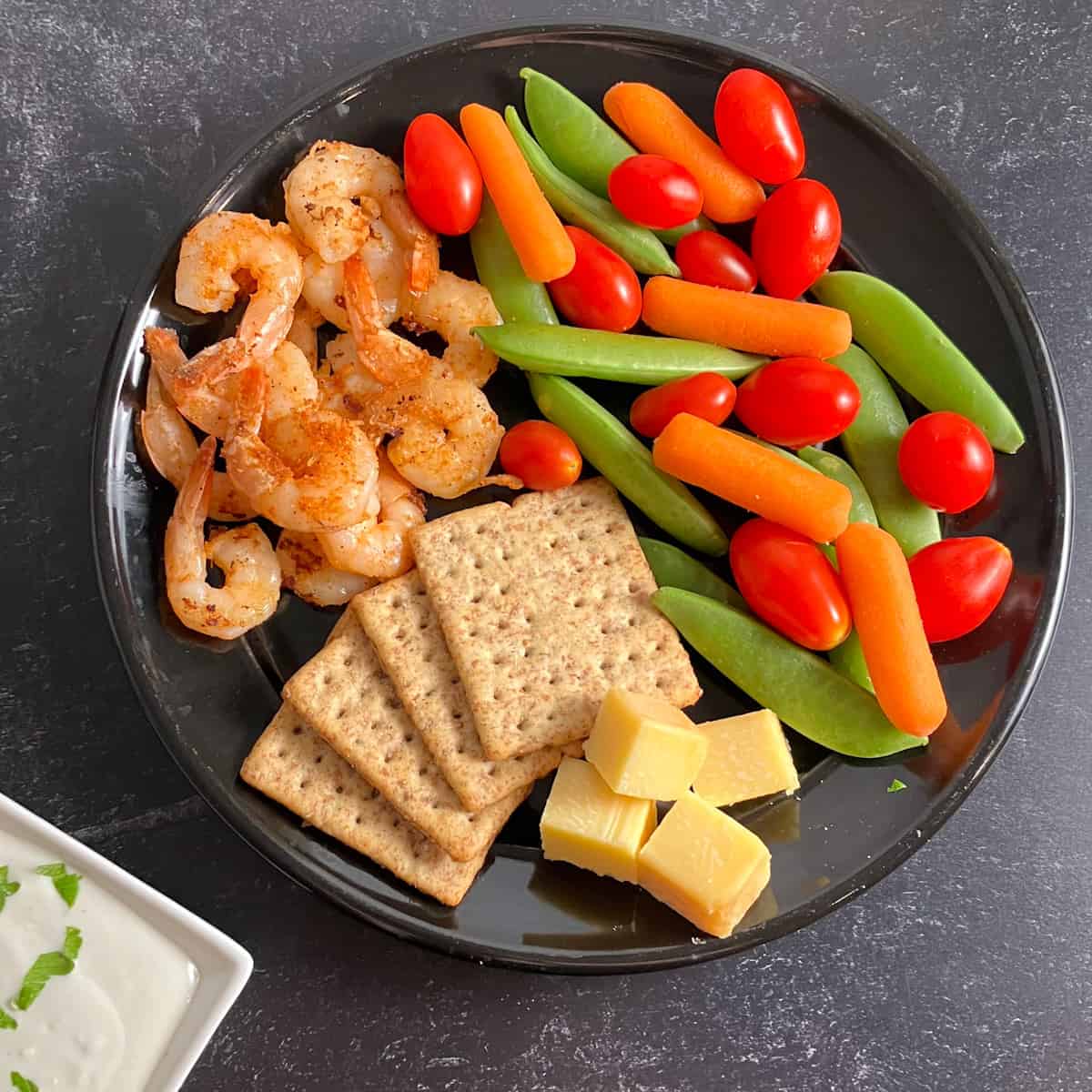
What this gives you is a meal of cheese and crackers with additional protein, plus veggies and dip. It’s all finger foods, which tend to be a hit with kids. Also, all of your food groups are covered (or close enough, since many items we call veggies are botanically a fruit).
Regardless of whether you have a weight loss goal, this “recipe” will help you get dinner on the table fast. It cleans out those leftover fridge odds and ends. You can modify as needed to fit the preferences, diets, allergies, etc. of your household members.
Additionally, it requires no cooking (if you purchase precooked protein), and you don’t have to eat with utensils. There is basically no downside to making MyPlate dinners, so why not give them a go?
Here’s another MyPlate example:
- 4 ounces grilled chicken
- Broccoli, red bell peppers, and mushrooms (fill half the plate)
- 1-2 ounces whole grain crackers
- 1 ounce pepper jack cheese
- 2-4 tablespoons special sauce
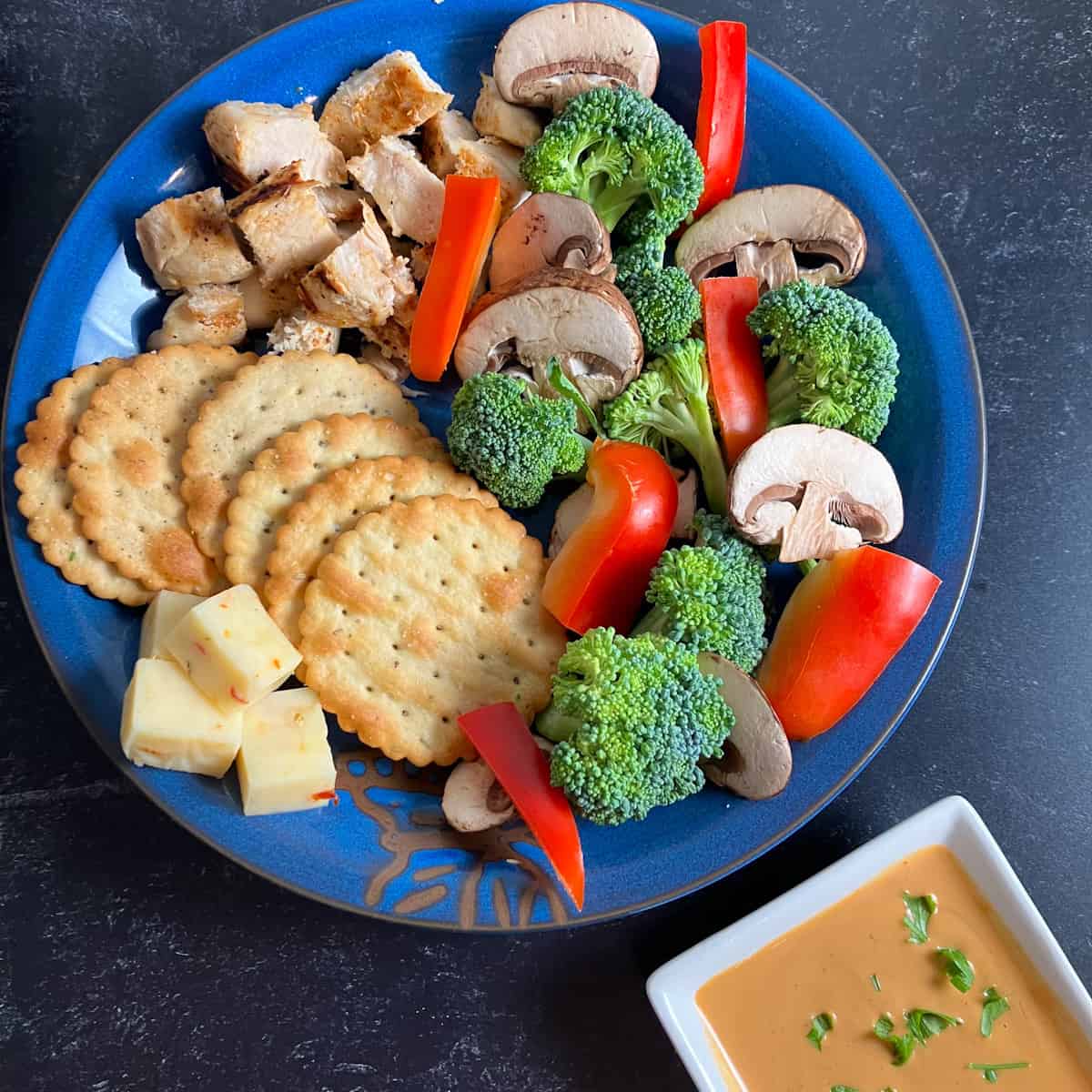
MyPlate 7-Day Meal Plan
I’ve given you two meal ideas above, but the MyPlate plan can be used to create infinite meals! Here’s what a MyPlate weekly meal plan might look like.
| Day | Breakfast | Lunch | Dinner |
|---|---|---|---|
| Sunday (Day 1) | Quiche in whole grain crust with cheese, eggs, broccoli. Apple on side | Beef vegetable soup with crackers and a glass of milk | Meatloaf, mashed potatoes, Swiss chard, glass of milk |
| Monday (Day 2) | Oatmeal topped with bananas, strawberries, and peanut butter. Glass of low-fat milk | Turkey and cheese sandwich on whole-wheat bread. Side salad packed with veggies | Grilled shrimp, cheese, crackers, celery, carrots, mushrooms, and your favorite dip |
| Tuesday (Day 3) | Veggie omelet with cheese. Toast and an orange on side. | Split pea veggie soup with whole wheat crackers and a glass of milk | Cheeseburger on a whole grain bun with a side salad |
| Wednesday (Day 4) | Oatmeal topped with cinnamon, nuts, and raisins. Glass of milk | Grilled chicken salad with lots of veggies, topped with cheese and tortilla strips | Steak with bell peppers, onions, mushrooms, with cheesy brown rice on side |
| Thursday (Day 5) | Veggie omelet with cheese. Toast and blueberries on side. | Chicken noodle soup (packed with veggies). Milk and an apple on the side | Grilled chicken, cheese, crackers, snap peas, grape tomatoes, radishes, and your favorite dip |
| Friday (Day 6) | Whole grain cereal with milk and raspberries. Hardboiled egg on side | Tuna salad sandwich with green salad, apple, and glass of milk | Black bean and sweet potato curry over rice with a glass of milk |
| Saturday (Day 7) | Quiche in whole grain crust with cheese, eggs, asparagus. Berries on side | Grilled cheese and tomato sandwich with bean and corn soup | Seasoned tilapia with quinoa, watermelon cucumber salad and glass of milk on the side |
🥣 What meal has all 5 food groups?
Salads often contain all of the food groups. If your salad doesn’t include croutons, tortilla strips, or another grain, it’s easy to add bread or crackers on the side. Some soups and casseroles are meals with all 5 food groups (though you may need to add a fruit side dish).
Luckily, there are endless combinations of foods you can use to make MyPlate meals. Take the ideas in the following sections and mix-and-match to make a perfectly delicious dish.
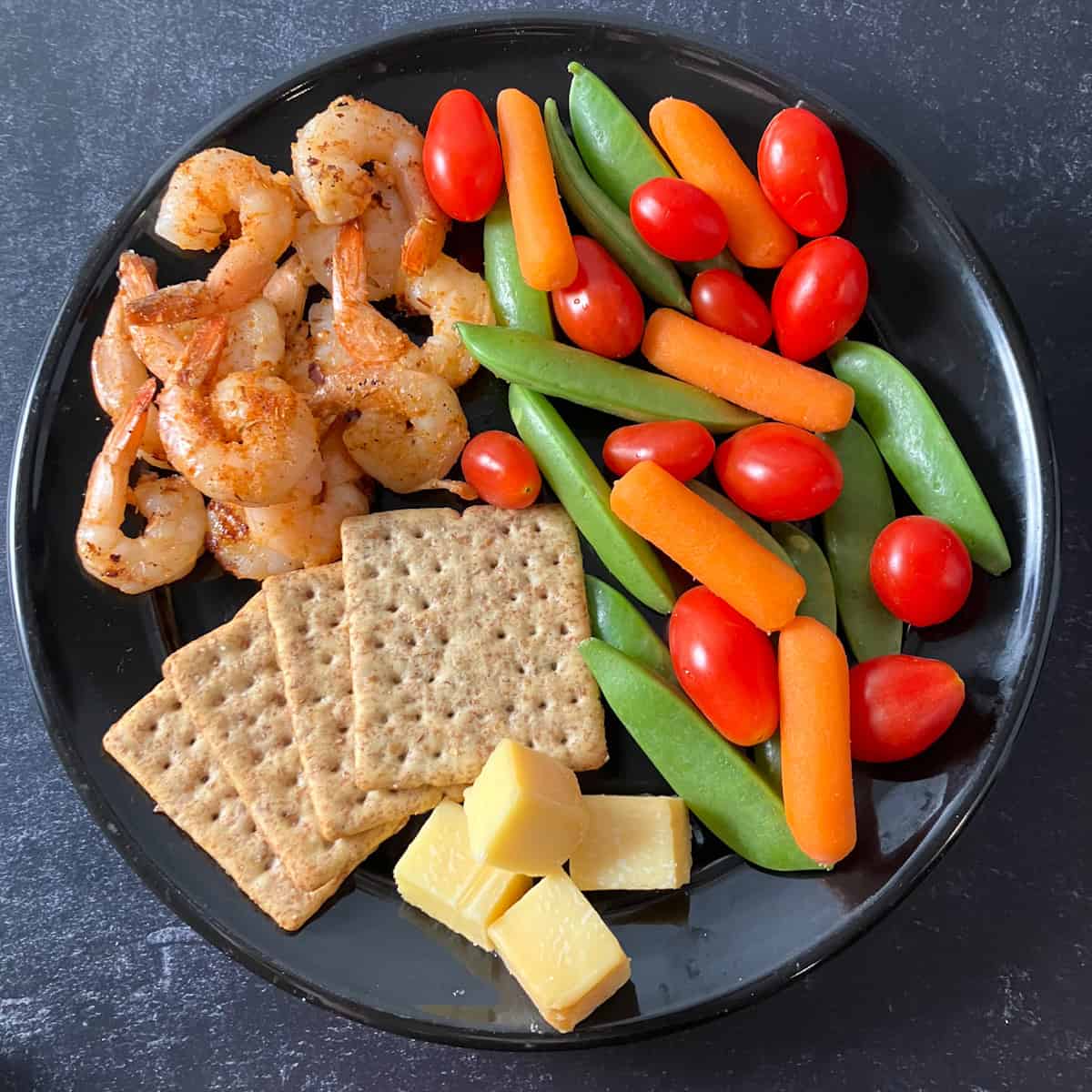
Protein
Make sure to include a source of protein in your MyPlate meal. If you use leftover finger foods, you don’t even need to cook anything! Here are some foods in the protein food group:
- Rotisserie chicken breast
- Steak
- Ham (pork)
- Turkey
- Falafel
- Shrimp
- Marinated tofu
- Edamame
- Black beans
Choose lean protein options (such as shrimp, chicken breast, or tofu) if you want a low-calorie meal.
Fruits and Veggies
The MyPlate dinner formula is a great way to help clean out any leftover veggies you have hanging around in the fridge. Since we’re serving the vegetables raw with a dip, you want to use non-starchy salad veggies.
I typically try to use veggies of three different colors for a broader range of phytonutrients. If you don’t happen to have three differently-colored veggies, it’s fine to make do with what you have.
In fact, feel free to use sliced fruit if you don’t have enough vegetables. (You’ll have to use good judgment regarding whether to use the fruits with the dip, of course.)
Even if you have a weight loss goal, you can pretty much add as many non-starchy veggies as you want to your plate. They are extremely low in calories and provide a lot of volume to the meal. Here are some options I recommend (and yes, I know some of these are botanical fruits and mushrooms are actually fungi):
- Carrot sticks
- Celery sticks
- Grape tomatoes
- Radish slices
- Mushroom slices
- Jicama sticks
- Cucumber slices
- Green beans
- Snow peas
- Broccoli florets
- Cauliflower florets
- Bell pepper strips
If your family members prefer certain veggies while you like others, you can give everyone a slightly different meal. This is one of the easiest “recipes” to modify since it does not require additional cooking.
Dairy (or calcium alternative)
I always serve 1 ounce of cheese (per person) with this meal to add some calcium. We’ve had fun trying an assortment of cheeses through the years in our MyPlate dinners.
The important part of this meal component is the calcium and protein, not that it must be cheese. You can serve the meal with a glass of dairy milk if you’d prefer. Or you could skip this component and use a yogurt-based dip instead (see below).
If you don’t consume dairy, keep in mind that many of the non-dairy cheese alternatives are not fortified with calcium. My sardine salad includes bone-in canned sardines, an excellent source of non-dairy calcium. Using the crackers and veggies to scoop the salad keeps everything a finger food.
Some brands of tofu are fortified with calcium, potentially covering your calcium needs in this meal (source). Be sure to check the label of the tofu you purchase, as not all products have been fortified. The bioavailability of calcium in spinach (and some other greens) is poor (source); you should not use these as your calcium source.
Grains (preferably whole grains)
Homemade whole grain crackers, store-bought crackers, tortillas, and bread work well in the MyPlate meal. If you are on a keto, low-carb, or gluten-free diet, you could use store-bought crackers that align with those approaches.
Occasionally when I was on my weight loss journey, I’d skip the serving of crackers in my MyPlate dinner. It’s an easy way to cut 100-150 calories from the meal while keeping the more nutrient-dense components.
On the other hand, sometimes my family members (particularly my teen) serve themselves a double helping of the crackers. Remember, this MyPlate meal plan is a flexible meal plan to meet your needs.
Healthy Fat
Healthy fats aren’t a food group, per se, but raw veggies can benefit from enhancement, so I recommend adding a dip. If you’re making cooked veggies, they are usually cooked with oil or served with butter, so you’re getting fat that way.
Here are a few dips to serve with vegetables. Some (like guac and avocado hummus) are high in healthy fats while others (like salsa) are low fat or nonfat.
- Guacamole
- Salsa
- Hummus
- Black bean dip
- Yogurt-based dips (such as tzatziki)
- Olive oil and vinegar
- Your favorite salad dressing or dip (Trader Joe’s has a lot of great options)
If I’m serving shrimp with the meal, I often add cocktail sauce on the side as well. The calories in certain dips and dressings can add up fast. I recommend paying attention to this component’s portion size if you have a weight loss goal.
That covers the basics of what you need to know to create this meal. The MyPlate recipe is a great way to sample new meats, cheeses, crackers, veggies, and dips you’ve never had before. Making healthy food choices can be fun!
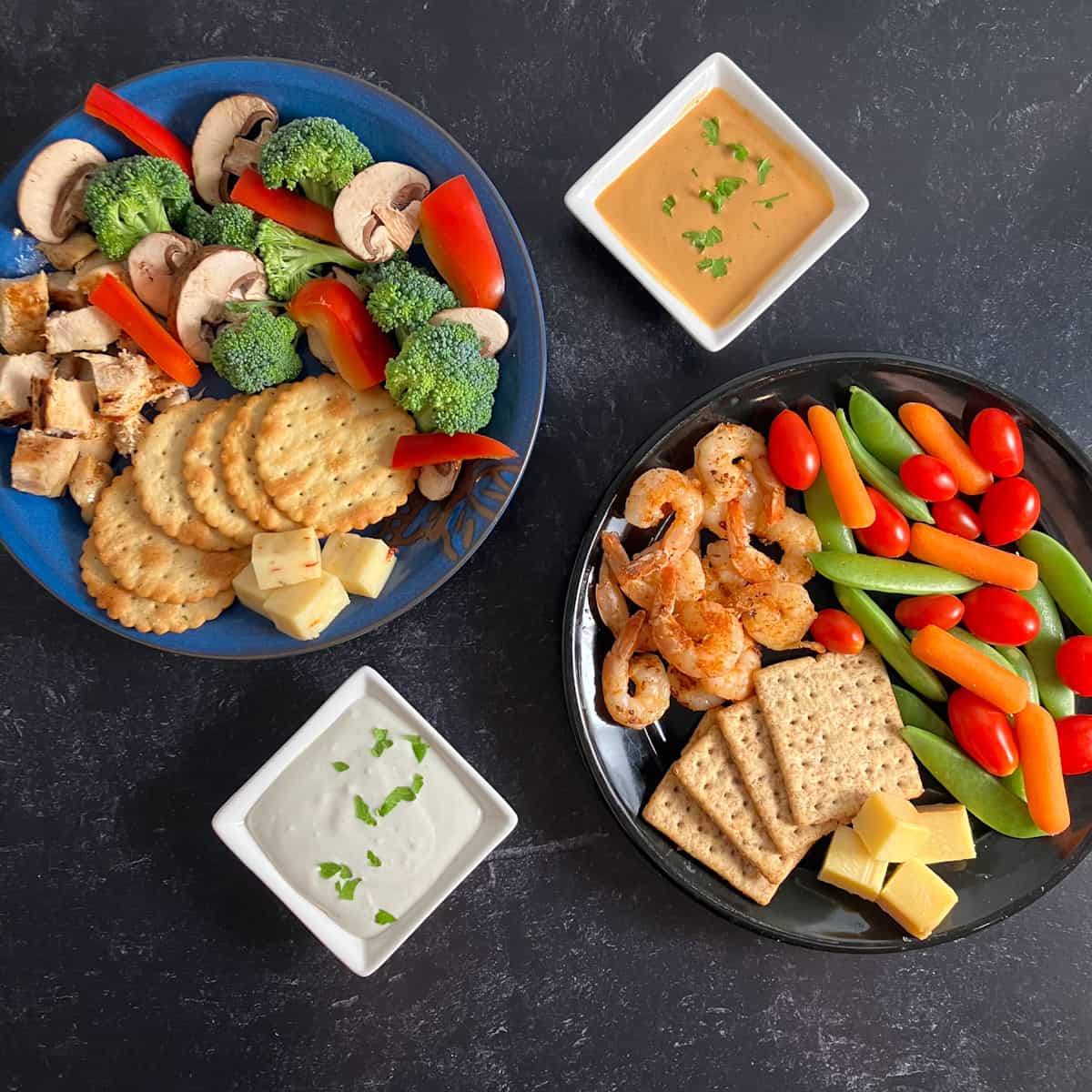
FAQs
Is there a MyPlate meal plan for toddlers?
Choosemyplate.gov recommends that 2-year-olds consume "a variety of fruits, vegetables, grains, protein foods, and dairy and fortified soy alternatives.” Use the MyPlate plan here to help guide how much toddlers should eat from each food group each day. Ask your child’s pediatrician if you have any specific questions about diet.
What are the MyPlate meal recommendations for a client who is obese?
The MyPlate plan here can be used to personalize a meal plan within a certain calorie allowance. The client and dietitian should work together to determine a safe and sustainable level of calorie deficit. That said, the point of MyPlate is to encourage clients to think more about the types of food on their plate rather than the calories (source).
What are the 6 MyPlate food groups?
MyPlate actually has 5 food groups, not 6. They are fruits, vegetables, grains, protein, and dairy or calcium-fortified soy alternatives.
How to make a MyPlate dessert?
The MyPlate model is for meals, not desserts. Desserts can be a great way to cover food groups that may be lacking in meals. For example, you can snack on fresh fruit if you don’t often have it with meals.
Where can I find a MyPlate 2 week meal plan?
You can find a MyPlate 2-week meal plan here. Please note that this is a general MyPlate plan pdf I sourced online. It may not be appropriate for your individual needs.
MyPlate vs Food Pyramid- what's the difference?
The US switched from the MyPyramid to the MyPlate in 2011 to better show appropriate portion sizes. For example, the MyPlate shows fruits and veggies taking up the biggest portion on the plate, while the original Food Pyramid devoted the most space to grains.
👩🏻🍳 MyPlate Breakfast, Lunch and Dinner Recipes
Need more ideas? Here are some MyPlate recipes for all meals!
MyPlate Dinner Recipes
These recipes give you a healthy dinner with all food groups. There are some MyPlate vegetarian recipes here as well!
MyPlate Breakfast Meals
MyPlate breakfast recipes are pretty easy to make. In general, fruits will play a bigger role than veggies in MyPlate breakfasts. However, the baked protein oatmeal with meat recipe below is packed with vegetables for a change of pace.
MyPlate Lunch Recipes
MyPlate lunches and dinners can be used interchangeably, depending on whether you work from home.
Are there MyPlate backpacking meals?
Not really, unless you make your own healthy recipes. Backpacking meals aim to pack a lot of calories into small, lightweight portions, and are appropriate for active lifestyles. Meanwhile, the MyPlate aims to fill your plate with lots of perishable high volume, low cal fruits and veggies.
Additionally, the sodium and saturated fat in many backpacking meals is high, since they’re highly processed foods. In short, freeze-dried backpacking meals tend to not fit well with MyPlate meal plans.
Join our community! Subscribe for all of the latest and greatest recipes, and follow me on Facebook, Pinterest, Instagram, and YouTube!
📖 Recipe Card
Watch How to Make It!
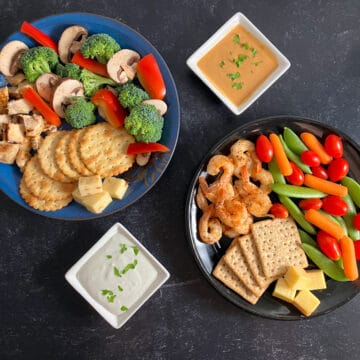
MyPlate Meals Examples (MyPlate Meal Planner Food Guide)
Ingredients
- 4-6 ounces cooked protein-rich food, cut into bite-size pieces (113-170 grams; leftovers are perfect for this)
- 3 types fruits or non-starchy veggies, cut into coins or sticks (as much as you want)
- 1 ounce dairy cheese, cubed (28 grams; see article above for alternatives)
- 1 serving crackers, bread, or another grain (100-150 calories total)
- 2-4 tablespoons dip of choice
Instructions
- Note: for more detailed information on choosing components for your MyPlate meal, be sure to read the post that accompanies this recipe.
- Plate your protein, cut veggies or fruits, cheese, and crackers. Enjoy with the dip. Seriously, that is it. Can healthy meals get any easier?
Equipment
Notes
💭 Expert Tips from Dietitian Summer Yule
This is a level 1 recipe (may help support fat loss). If you have a weight loss goal, it is very easy to create a low-calorie, high-volume MyPlate dinner. I’d do something like this:- 4 ounces lean protein (~150 calories)
- Three non-starchy veggies (under 50 calories)
- 1 ounce of cheese (~120 calories or use a low-fat cheese)
- One serving of crackers (~100-150 calories) or skip these
- 2-4 tablespoons of a light dip or dressing (~50-100 calories)
nutrition info disclaimer
All recipes on this website may or may not be appropriate for you, depending on your medical needs and personal preferences. Consult with a registered dietitian or your physician if you need help determining the dietary pattern that may be best for you.
The nutrition information is an estimate provided as a courtesy. It will differ depending on the specific brands and ingredients that you use. Calorie information on food labels may be inaccurate, so please don't sweat the numbers too much.
"To taste" means to your preferences, which may have to be visual to follow food safety rules. Please don't eat undercooked food x
Nutrition
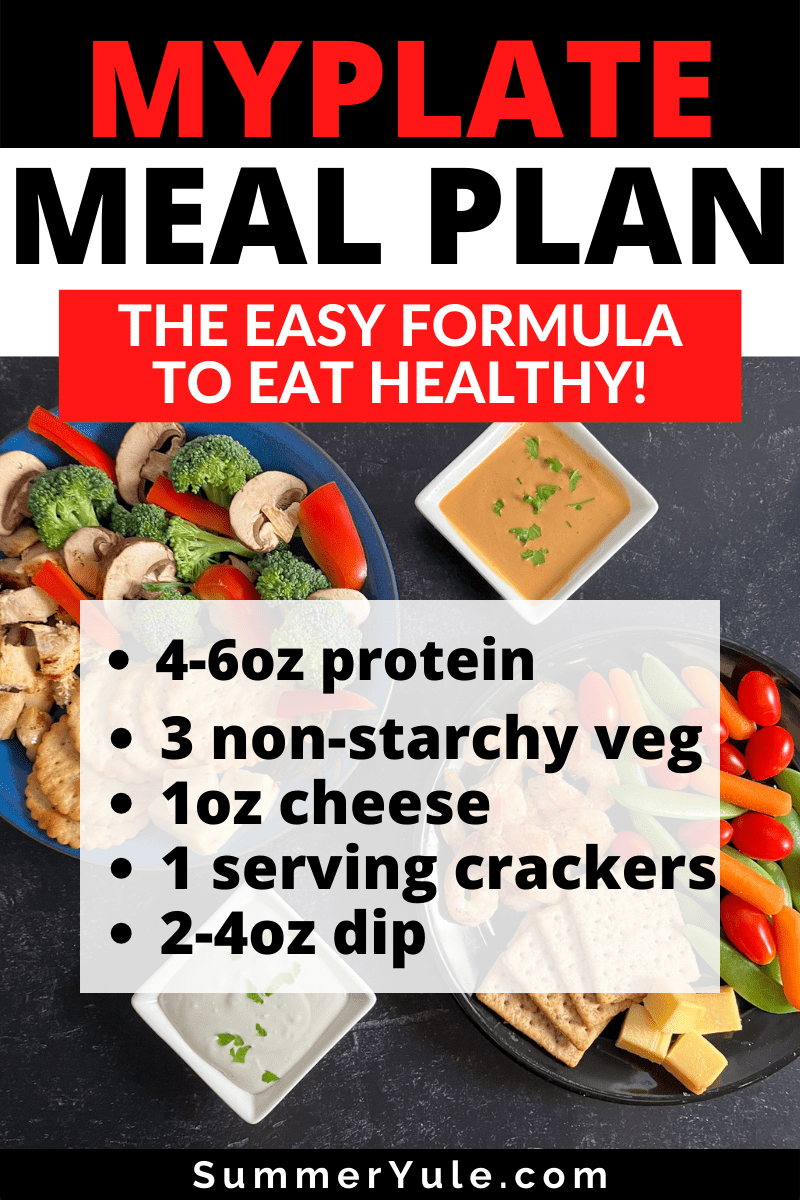

Hello! I'm Summer, a registered dietitian and home chef who loves to cook, eat, and create high quality content for you! Every recipe on this site has been tested by me to help ensure your success in the kitchen. All eaters are welcome here 🙂


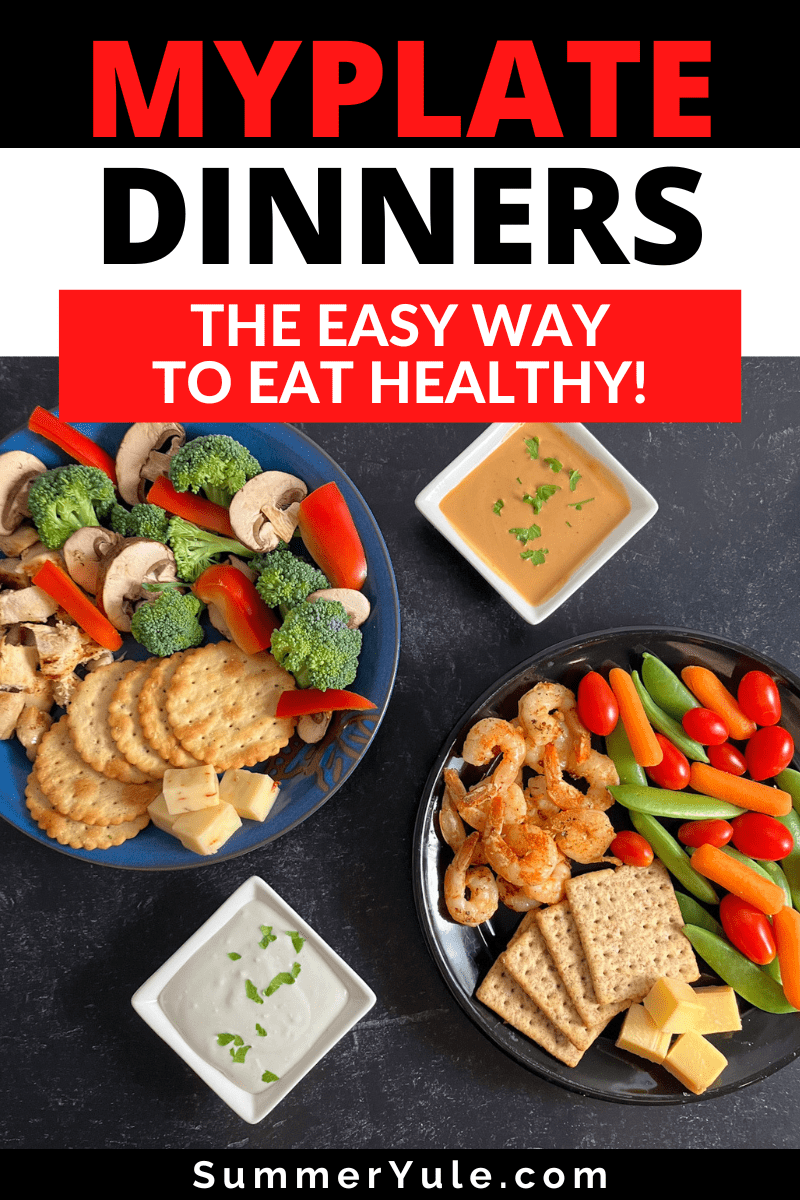
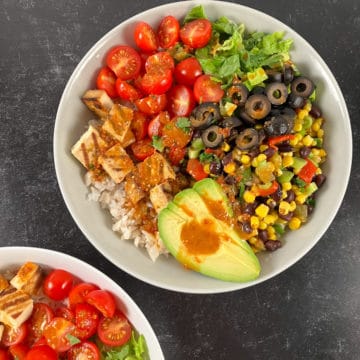
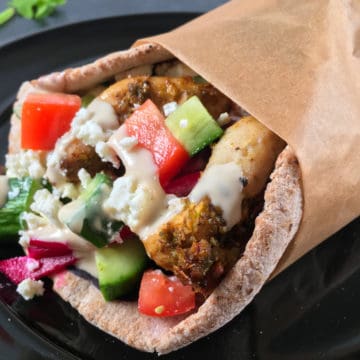
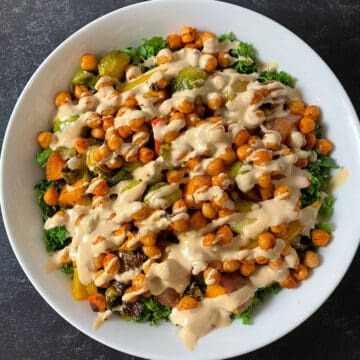
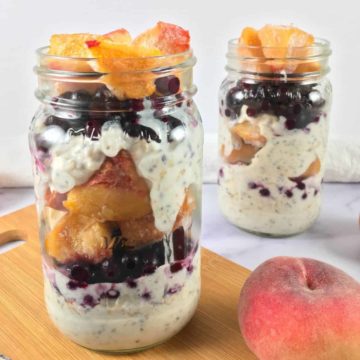
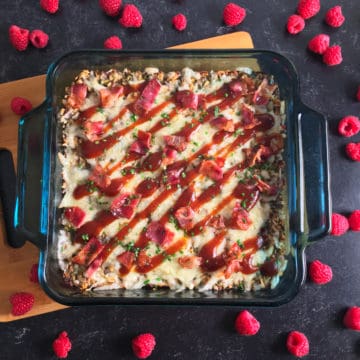
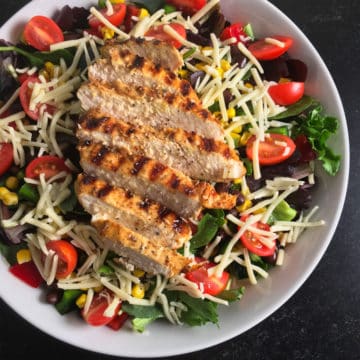
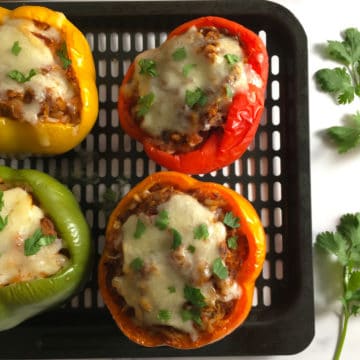
Terrified Amateur says
Wow, Summer, great idea! With "a little of everything," but in dizzying variety, one finds satisfaction without overindulging. You've created an all-you-can-eat buffet, except, you know, with healthy stuff
Plus, combine two or more items for all manner of delightful discoveries. "Hey, I think I just invented a "thing" here."
When I first saw the picture, my eyes went to your promise of no cooking. As I assumed what's in the top-center is a raw steak, I couldn't believe you were advising us to get in touch with our inner-saber-tooth-tigers. Then I read on... Oh, oh, oh! I see.
Summer Yule says
Hahaha! That is too funny. I have had steak tartare but I know that sort of thing is frowned upon here for food safety reasons. My son tends to prefer steak cooked to a shoe leather-style well-done so I really don't think raw would go over well!
I actually wasn't sure when I received the prosciutto cotto whether I needed to cook it or not. It took a visit to Google to learn that it is a cooked ham. Have you tried it?